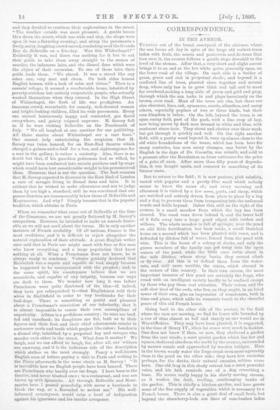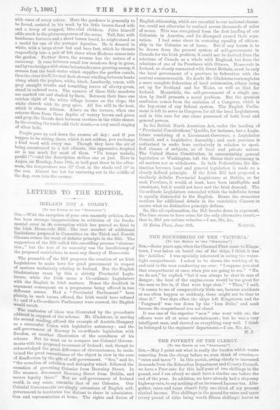CORRESPONDENCE.
IN THE AVENUE.
TURNING out of the broad courtyard of the chateau, where the sun burns all day in spite of the large old walnut-trees laden with fruit, the acacia and paulownia and fir-trees that lean over it, the avenue follows a gentle slope downhill to the level of the stream. After that, a very short and slight ascent brings it to an end at the low white gates, generally open, on the lower road of the village. On each side is a border of grass, green and rich in perpetual shade; and beyond it a confused line of trees, planted close together and several deep, whose only law is to grow thick and tall and to meet far overhead,making a long aisle of green and gold and grey, through which the sun looks in and plays harmlessly on the brown, even road. Most of the trees are elm, but there are also chestnut, lime, oak, sycamore, acacia, ailanthus, and many others, especially poplars of two or three kinds, but their own kingdom is below. On the left, beyond the trees, is an open sunny field, part of the park, with a fine crop of hay, now being mown by dark men dressed in white and blue, with sunburnt straw-hats. They shout and chatter over their work, but get through it quickly and well. On the right another field, with a pretty wood beyond it, runs up almost close to the old white foundations of the house, which has been here for many centuries, has seen many changes, was burnt by the English in the days of Du Guesclin, was rebuilt, and sold to a peasant after the Revolution as biens nationaux for the price of a yoke of oxen. After more than fifty years of degrada- tion, it was bought again, and restored to something of its former state.
But to return to the field ; it is now pasture, pink sainfoire. varied with poppies and a pretty blue weed which nobody seems to know the name of ; and every morning and afternoon it is visited by a few cows, goats, end sheep, which are watched and actively driven from plane to place by a boy and a dog, to prevent them from trespassing into the unfenced woods and fields beyond. Below this, still on the right of the avenue, is a small meadow from which the hay has been cleared. The wood runs down behind it, and the lower half of it falls away into a large pond edged with rushes and willows. The whole meadow is full of springs ; near the pond an odd little fortification has been made, a small thatched house on a mound which has been planted with roses, and is defended by ditches fall of water, fenced from the pond with wire. This is the home of a colony of ducks, and only the grown members of the family can get away into the open waters of the pond, while the little ones swim about in the safe ditches, whose steep banks they cannot climb or fly over. All this is to defend them from the water- rats, and still more terrible, the otters, which abound in the waters of this country. In their own esteem, the most important inmates of this pond are certainly the frogs, who croak with an intelligent variety hardly to be realised except by those who pay them real attention. Their voices, and the soft slow hoot of the owls, who live,. as they ought, in an ivied tower of their own, give an impression of remoteness, both in time and place, which adds its romantic touch to the cheerful peace of this old French home.
Going back to the other side of the avenue, to the field where the men are mowing, we find its lower side bounded by a row of elms almost as tall and stately as one would see in Warwickshire. They may have been planted, it is suggested, in the time of Henry IV., when lee ormes were much in fashion. One does not know if then, as now, they sheltered a garden from the east winds; a most quaint garden which lies low and square, sheltered also from the north by the avenue, surrounded by narrow canals and approached by wooden bridges. Here in the brown weedy water the frogs croak even more agreeably than in the pond on the other side ; they have less anxieties perhaps, for the ducks, their natural enemies, seldom come here. One old frog in this shady retreat has a most powerful voice, and his talk reminds one of a dog crunching a bone. He seems really happy in his slowly moving stream, as it washes the dark, trailing, overhanging banks of the garden. This is chiefly a kitchen-garden, and here grows some of the fine supply of vegetables which is necessary to a French house. There is also a great deal of small fruit, but beyond the strawberry-beds are lines of rose-bushes laden with roses of every colour. Here the gardener is generally to be found, assisted in his work by his little brown-faced wife and a troop of cropped, blue-clad children. Jules himself adds much to the picturesqueness of the scene, Tall, fair, with handsome features and a short brown beard, he might stand as a model for one of the younger Apostles. He is dressed in white, with a large straw hat and bare feet, which he thrusts respectfully into a pair of felt shoes when Madame comes into the garden. Farther down, the avenue has the nature of a causeway. It runs between small low meadows deep in .grass, and bytwo bridges with stone balustrades now growing mossy, it crosses first the back-water which supplies the garden canals, then the river itself, its cool dark stream winding between banks along which the poplars, white, black, Lombardy, aspen, with grey straight trunks and trembling leaves of silvery-green, stand in ordered rows. The squares of these little meadows are marked out and shaded by them. Between their lines one catches sight of the white village houses on the slope, the white church with its grey spire. All lies still in the heat, which is almost African. Above on the terrace, when one returns there from these depths of watery brown and green and grey, the lizards dart between crevices in the white stones. In the evening the toads add their music,—a very small ringing of silver bells.
People pass up and down the avenue all day ; and if you happen to be sitting there, which is not seldom, you exchange a kind word with every one. Though they have the air of being accustomed to a hot climate, this oppressive, tropical air is too much for most of them. " TJn temps malade, pardi6 I "—and the description strikes one as just. Here in Anjou, on Monday, June 19th, at half-past three in the after- noon, the tetuperature was 32° Cent, in the shade and 58° in the sun. Almost too hot for venturing out in the middle of the day, even into the avenue.











































 Previous page
Previous page